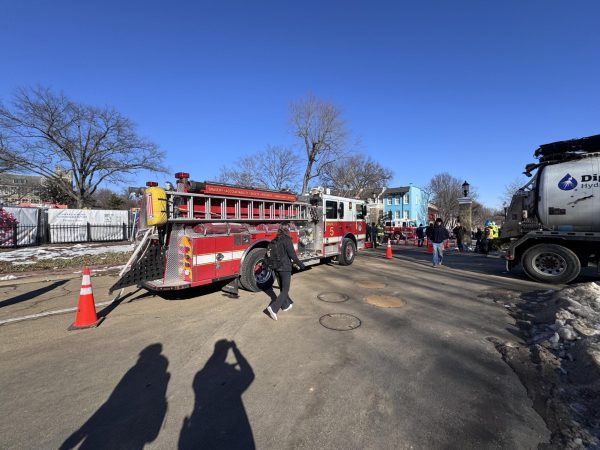Damage from Jan. 20 flooding on the lower levels of the Davis Performing Arts Center (DPAC) is affecting academic and co-curricular performance groups on campus amid construction on Healy Circle and Copley Lawn following a natural gas leak that interrupted classes Jan. 15.
According to Robert Hand, director of production in the department of performing arts, flooding in DPAC left three inches of water in the basement level and approximately three feet of water in the cellar level, where department of performing arts classrooms are located. The gas leak, the cause of which the university has not yet publicized, caused the evacuation of classes in White-Gravenor Hall.

A university spokesperson said the evacuation of White-Gravenor was temporary and the impacted buildings have fully restored gas service.
“The area was closed off, and occupants of White-Gravenor Hall were evacuated out of an abundance of caution,” the spokesperson wrote to The Hoya.
“The leak was capped, and Washington Gas made repairs,” the spokesperson added. “Once the leak was capped, the building occupants were able to return.”
Daniel Tomas (SFS ’26), who was evacuated from a discussion section in White-Gravenor due to the gas leak, said post-evacuation procedures for continuing class were unclear.
“We went downstairs, left, went down the ramp to Red Square, and there was no one there other than everyone that was just evacuated, the TAs,” Tomas told The Hoya. “No one from maintenance was there to direct us or help tell us to evacuate.”
Tomas said that although he only missed the last 15 minutes of class, he feels frustrated by the frequency of facilities- and construction-related issues on campus.
“I think Georgetown University really needs to improve how facilities have been working with construction,” Tomas said. “I think a lot of students have encountered plenty of issues that the university has not been able to tackle properly, and so between the administration and facilities, they should really become more efficient.”
Maya Roth, a professor in the department of performing arts, said that following the Jan. 20 flood, students in theatre and performance studies classes were relocated to other spaces in DPAC.
“For a short-term interim, the team was able to figure out where to place them, and all classes went ahead today within our own space,” Roth told The Hoya.
According to Hand, the flooding broke the elevators in the building, destroyed classroom flooring on the lower two levels, damaged faculty offices, filled the orchestra pit with four feet of water and damaged some of the department’s set and props inventory. Hand added that the full impact — including timelines for repairs and reopening — remains unknown.
“It’s always going to be about who’s responsible for what and who’s paying for what,” Hand told The Hoya. “And nobody’s ready to talk about any of that right now because we’re just assessing what’s damaged.”
Roth said the university has been prompt in responding to the flood and in making accommodations for impacted classes.
“The good news is that both academic chains, as in the dean and provost office, and the planning and facilities folks, and the registrar knew of the problem, were consulting,” Roth told The Hoya. “So there’s communication across folks.”
Roth said the damages to the soft goods inventory, which includes props, furniture and curtains, will impact the academic and co-curricular groups who rely on the department for their productions.
“We are a resource for many different folks on campus, and within the department, there’s music, dance and theater,” Roth said. “So the impacts are multiple.”
The next student performance set to take place in DPAC is the Georgetown University Dance Company’s spring performance, scheduled in the Gonda Theatre on Feb. 21 and 22.
Rishu Nevatia (CAS ’27) is directing a play for the Donn B. Murphy One Act Festival, a student-written and student-produced one-act play festival held annually by the Mask and Bauble Dramatic Society, a co-curricular theatre group on campus.
Nevatia said the production team is exploring alternative options to acquire props before their Feb. 13 opening.
“We don’t have the budget to buy new pieces, nor do we have the space to buy new pieces to replace the ones that we would have pulled from the cellar, and so that’s causing a lot of scrambling in terms of what we can do with what we have,” Nevatia told The Hoya.
Roth said that, for the good of the Georgetown community, the shows must go on.
“It’s core not just to the curriculum but to community engagement — and I think the life of the campus and vitality — being able to have some performances here,” Roth said.













